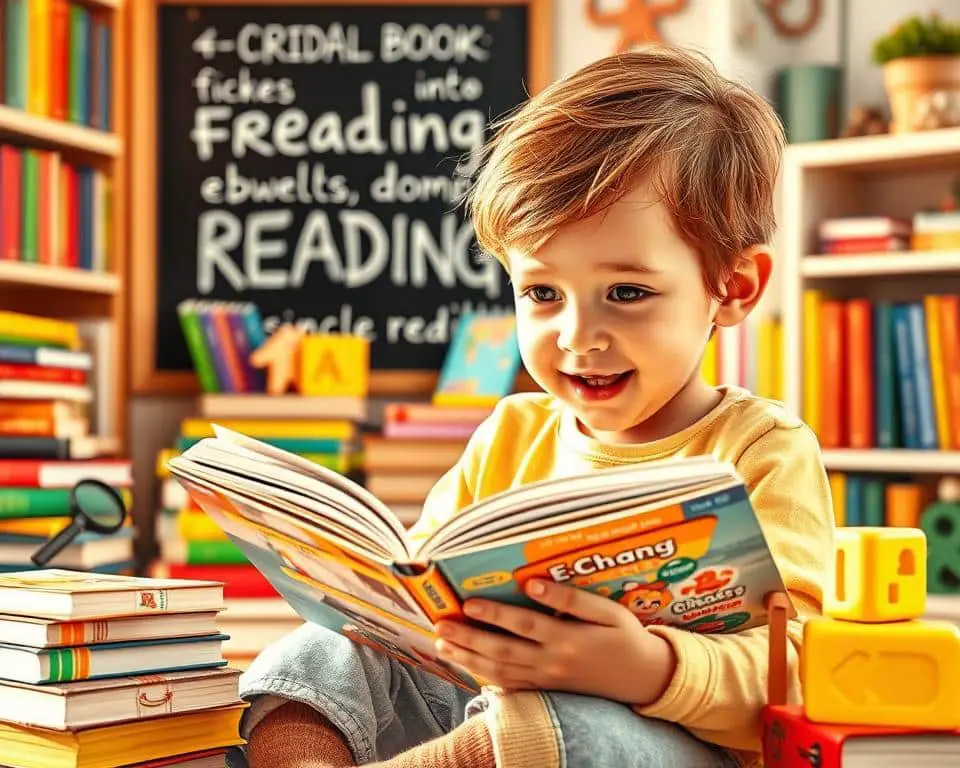Reading to children is very important in today’s world. It helps with early literacy and builds a strong bond between parents and kids. Reading also improves a child’s vocabulary, which is key for school success.
Experts say reading is crucial for a child’s education. It sets them up for a lifetime of learning. By making reading a daily habit, parents give their kids a love for books and learning.
Key Takeaways
- Reading enhances early literacy skills, preparing children for academic success.
- It fosters strong vocabulary development, critical for children’s education.
- Parents and children build emotional bonds through shared reading experiences.
- Consistent reading creates lifelong learning habits.
- Engaging in reading can make learning enjoyable for children.
The Million Word Gap: What It Means for Early Literacy
Recent studies have shown a big gap in words kids hear. This gap is huge because of how much kids are read to. Kids who get read to a lot learn lots of new words. This helps them a lot in learning to read early on.
Statistical Evidence from Recent Studies
Jessica Logan from The Ohio State University found something interesting. She found that by age five, kids who get read to a lot hear about a million more words. This shows how important it is to read to kids early and often.
Impacts on Vocabulary and Reading Development
Logan worked with the Columbus Metropolitan Library too. She found that kids who get read to more often have bigger vocabularies. They also find it easier to read when they start school. Reading books regularly helps kids learn new words and read better.
This study shows how important it is to read to kids a lot. It helps them learn more words and do better in school.
The Cognitive Benefits of Reading to Children
Reading to kids at a young age is very good for their brains. It helps them grow and learn more. Books are key to their brain development.
Enhanced Brain Development
Reading to young children is great for their brains. It helps them connect words with pictures. This makes them understand language and ideas better.
This boosts their intelligence and how they process information. It’s a big help for their learning.

Building a Knowledge Base
Books are vital for kids to learn. Through stories, they get a lot of information. This helps them build a strong base for learning later on.
This early learning makes them ready for harder subjects. It also helps them understand the world better.
To see how reading helps kids, look at this table:
| Key Aspect | Benefit |
|---|---|
| Listening | Enhances attention and auditory processing skills |
| Visual Interaction | Strengthens image-word association and comprehension |
| Storytelling | Boosts imagination and narrative skills |
| Knowledge Acquisition | Builds a wide range of informational foundations |
Reading to Children: Fostering Emotional and Social Growth
Reading to children is a special way to help them grow emotionally and socially. It strengthens the parent-child relationship. It also helps build positive interactions and empathy.
Developing Empathy Through Stories
Stories are great for teaching empathy. When kids meet characters in books, they learn to see things from others’ viewpoints. This helps them understand different feelings and thoughts.
This learning is key for empathy development. It shows kids the value of being kind and caring.
Strengthening Parent-Child Bonds
Reading together is fun and important for a strong parent-child relationship. It creates a special time for emotional connection. This gives kids the safety and love they need.
When parents read to their kids, it builds trust and closeness. These are essential for a child’s emotional growth and happiness.
Improving Social Skills and Interactions
Books are also great for teaching social skills. Through stories, kids learn about various social situations and how to react. This knowledge helps them deal with real-life interactions better.
As a result, their social skills and confidence grow. This prepares them for good relationships in the future.

How Early Reading Influences Academic Success
Reading from a young age sets the stage for success in school. It introduces kids to fun and structured reading. This boosts skills needed for school and helps them do well.
Correlation Between Reading and Academic Achievement
Research shows a clear link between early reading and doing well in school. Reading often improves language skills. It also helps in math, science, and social studies.
Children who read a lot do better in tests and schoolwork. This shows the power of reading early on.

The Role of Reading in Developing Concentration and Discipline
Reading early on makes kids focus and understand complex ideas. This builds concentration and discipline. These skills are key for doing well in school.
They help kids stay focused, finish homework, and handle school life. Starting these habits early leads to better learning and success.
The Role of Books in Expanding Vocabulary
Books are key in child development, helping young minds grow and learn new words. Kids who read a wide range of educational books get better at using words. This makes them more creative and able to talk better.

Reading to kids often introduces them to many words they don’t hear every day. This helps them understand language in different ways. Over time, they can express more complex thoughts.
Educational books also teach about different subjects and themes. They spark curiosity and teach new terms. This makes kids appreciate various subjects more.
So, it’s important to give kids a variety of books to read. It helps them love reading and prepares them for school and social life.
The Impact on Imagination and Creativity
Reading opens doors to many worlds and cultures. It deeply affects imagination in children and their creativity development. Books act as both a window and a mirror. They let young minds explore new ideas, imagine complex scenarios, and grow their creative skills.
Exploring New Worlds Through Books
Books have a special power. They take children to distant lands and magical places. Through stories, they can see themselves as explorers, adventurers, or heroes. This boosts their imagination in children.
This journey through stories helps them see things from different viewpoints. It makes them more open to exploring new ideas.
Sparking Creative Thinking in Children
When kids read stories, they learn to think creatively and solve problems better. This creativity development makes them ask questions, imagine possibilities, and find unique solutions. Reading helps them think outside the box.
This skill is very important for lifelong learning and personal growth.
The Importance of Consistent Reading Routines
Creating a regular reading routine is key for kids’ emotional and educational growth. It helps them feel stable and secure. Daily routines are important for their development.
Establishing Stable Daily Habits
Reading every day helps kids develop good habits. It makes them disciplined in learning. This habit boosts their academic and emotional success.

Predictability and Security Through Routine
For kids, knowing what to expect is very important. A daily reading routine gives them a sense of structure. This makes them feel safe and secure.
This stability reduces their anxiety. It makes them more open to learning and exploring. A consistent reading practice creates a safe space for their well-being.
How to Make Reading Interactive and Fun
Turning storytime into a fun and engaging experience can spark a lifelong love for reading. Parents and educators can make books come alive with interactive reading techniques. This makes reading both fun and educational.
Engaging Children Through Dialogic Reading
Dialogic reading is a great way to make books interactive. By asking children questions and encouraging them to share their thoughts, parents start a dialogue. This method improves understanding and makes reading more exciting.
Using Books to Encourage Conversations
Books are perfect for starting conversations. Choose stories with interesting themes and characters. This lets children share their thoughts and feelings, deepening their understanding.
Incorporating Songs and Sounds
Adding songs and sounds to reading makes it more enjoyable. Use music or sound effects that fit the story. This keeps kids engaged and makes reading a fun educational experience.
Access to Books and Resources
It’s key to make books and reading resources easy for kids to find. Local libraries are a big help. They also need the right books to make a big difference.
Utilizing Local Libraries
Local libraries are a treasure trove for kids’ books. They have lots of books for kids, making it easy for families to explore. Libraries also help kids feel part of a community and start reading early.
Recommendations for Age-Appropriate Books
Finding the right books for kids is important. Libraries have lists of books for different ages. This helps parents pick the best stories for their kids, keeping them interested in reading.
Encouraging Diversity in Book Selection
It’s vital for kids to see themselves and others in books. Books that show different cultures and backgrounds help kids understand and feel empathy. Keeping book collections diverse makes reading more inclusive and fun.
Conclusion
Reading to children is incredibly important. We’ve seen how it helps with early literacy and boosts their thinking and feelings. Starting them early on books sets them up for a lifetime of learning.
Reading together also makes kids smarter, kinder, and more creative. Every story time is a chance to help them grow. It’s not just about learning; it’s about bonding and creating a safe, fun space for them.
By making reading a daily habit, we open up new worlds for kids. We should pick books that fit their age and use places like libraries to help. This way, every child can enjoy reading and grow into a well-rounded, curious person.



